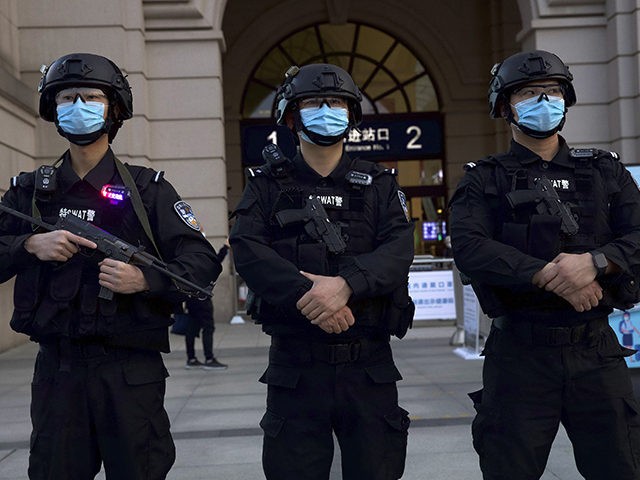Fox News on Wednesday cited a study that found the Chinese Communist Party (CCP) has jailed almost 500 people since the beginning of 2020 for talking about the Wuhan coronavirus.
The “crimes” committed by these political prisoners ranged from criticism of how the CCP handled the virus outbreak to innocuous observations that the funeral homes in Wuhan have exceptionally long lines these days.
The censorship report noted by Fox News was published last week by the U.S.-based China Digital Times (CDT), which included both world-famous outrages like the muzzling of Wuhan doctors Li Wenliang and Ai Fen and lesser-known arrests of citizen journalists and ordinary people who might be described as Internet randos in the United States:
According to statistics gathered by netizens, from January 1 to April 4, the national mourning period, there were 484 cases of individuals charged with crimes related to speaking out about the coronavirus. For example, a female lawyer in Henan was punished by the Lawyers Association for reposting an article entitled “Long Lines Outside Wuhan Funeral Home,” and retired Beijing University of Science and Technology lecturer Chen Zhaozhi was arrested.
Ren Zhiqiang, who last month described Xi Jinping as a “clown who stripped naked and insisted on continuing being emperor,” is presently undergoing review and investigation by the Beijing Xicheng District Disciplinary Commission for serious violations of the law and disciplinary code.
Following in the footsteps of Li Wenliang, another Hubei doctor was punished for “inappropriate speech.” Renowned science writer Dr. Yu Xiangdong received an official, red letter-headed written admonishment that mentioned him by name.
Dr. Yu’s actionably inappropriate speech was described by the censors as “cold and sarcastic humor which resulted in serious negative consequences.”
Some of the coronavirus censorship arrests occurred in the hot spots of CCP oppression, such as Hong Kong and Xinjiang province, home of the Uyghur Muslims, but CDT noted that “constant oppression of personal freedoms has unconsciously become a part of everyday life.”
“Even entertainment shows that have nothing to do with politics are being rigorously scrutinized and censored for political content,” the report noted.
Among the topics most likely to get Chinese subjects arrested by the speech police are listed the names of coronavirus victims, posts that dispute the official totals of infected and dead, first-hand accounts of the situation in Wuhan during the worst months of the epidemic, and posts that complain about oppressive censorship. Referring to someone who has already been censored or arrested is evidently a good way to capture the CCP’s baleful attention.
Fox News described one of the most recent censorship arrests, a constitutional lawyer named Zhang Xuezhong who dared to criticize how the CCP responded to the coronavirus outbreak:
In his letter posted on WeChat, Zhang Xuezhong, 43, said China’s absence of nonstate media and the prevention of medical experts from providing advice to the public showed that “the government’s long-term tight control society and people has almost completely destroyed the organization and self-help capabilities of Chinese society.”
He denounced China’s government as backward and said “the outbreak and spread of the COVID-19 epidemic is a good illustration of the problem.”
“The best way to fight for freedom of expression is for everyone to speak as if we already have freedom of speech,” Zhang wrote on the WeChat post alongside the letter.
Zhang called for the drafting of a new constitution that would respect “modern political principles” instead of the primitive tyranny currently governing China — a reform that would implicitly dethrone the current despot, Xi Jinping, and his court. The day after he began circulating his trenchant open letter to Communist officials, three police cars arrived at his home in Shanghai to haul him away.
The South China Morning Post reported that he was released on Monday after “questioning” and has not responded to requests for comment about his arrest, although he did post a message on WeChat thanking his friends for their concern and saying he needed to get some rest.

COMMENTS
Please let us know if you're having issues with commenting.